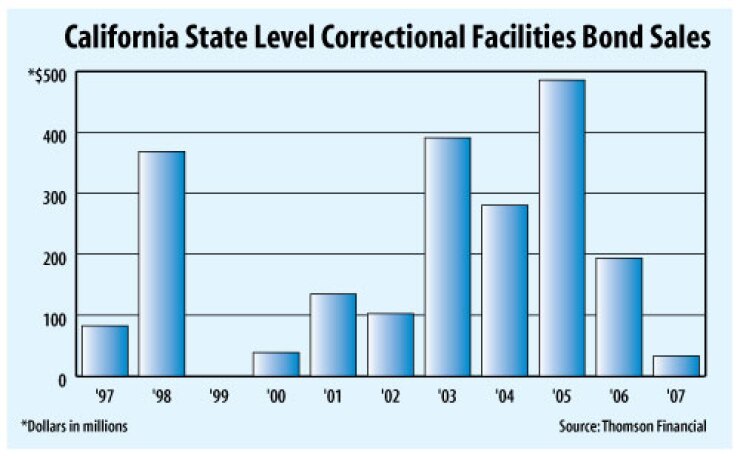

SAN FRANCISCO - The court-appointed receiver charged with bringing the health care system in California prisons up to snuff told state lawmakers this week that he needs $7 billion to do it - and he needs it soon.
"Beginning next fiscal year, we could easily need as much as $2.5 billion," the federal receiver, J. Clark Kelso, said in a phone interview. "We need to be able to encumber nearly the full amount within the next couple of years. It's very aggressive schedule I've put my team on."
A federal judge ordered the prison health system into a receivership in 2005, after ruling that the state had not moved quickly enough to implement a 2002 settlement agreement in a case brought challenging the constitutional adequacy of health care services provided to inmates.
On Monday, Kelso appeared before a California Senate budget subcommittee to tell lawmakers about the $7 billion in capital investment he says will be required to achieve that level of care, including $6.9 billion that would be raised through the sale of lease-revenue bonds.
The money would pay for seven new health care facilities, with about 1,500 beds each, to accommodate medical and mental health services meeting minimum constitutional standards, according to a presentation prepared for lawmakers by the California Prison Health Care Receivership Corp., the nonprofit organization Kelso heads.
California finance director Michael Genest, in a letter to lawmakers last Friday, said the implementation of Kelso's plans would require $6 billion in lease-revenue bond authority to pay for the seven new buildings, plus $900 million in lease-revenue bonds and $100 million in general fund money to finance improvements at existing facilities.
Of that total, $2.5 billion would be needed in fiscal 2009, Genest said.
The receivership corporation is empowered to bypass the state's procurement system to get the facilities built in a prompt fashion, according to Kelso, and that is one reason it will need the money quickly.
The projects will use an integrated project delivery approach, said Kelso, describing it as a sophisticated design-build procurement process.
"For each one of these structures, we need to encumber essentially the full amount at the beginning of the design phase for each structure," he said.
The senators on the subcommittee did not immediately embrace Kelso's message Monday.
The Sacramento Bee quoted panel member Christine Kehoe, D-San Diego, as saying "it borders on the incredible."
The receivership structure - in which California's authority over the prison health care system was suspended and granted to the receiver - gives the federal court, and ultimately U.S. District Judge Thelton Henderson, a great deal of latitude over the state government.
Kelso, however, said he prefers not to emphasize that aspect of his authority, saying he is confident he will be able to work toward a solution with the state Legislature without returning to the courtroom.
Henderson appointed Kelso as receiver in January, replacing the first receiver, Robert Sillen.
Kelso, a professor at the University of the Pacific's McGeorge School of Law in Sacramento, has become something of a fix-it expert in state government.
In 2000, he was named to serve as interim insurance commissioner following the resignation of the controversial Chuck Quackenbush, and in 2002 he was appointed to serve as California's chief information officer and charged with rebuilding the state's information technology program.
Kelso is expected to bring a less confrontational approach to the receivership than his predecessor, Judge Henderson said in the order appointing Kelso receiver.
"The second phase of the receivership demands a substantially different set of administrative skills and style of collaborative leadership," Henderson wrote.
"The receivership must continue to maintain its independence as an arm of the federal courts established to take over state operations, but it also must work more closely at this stage with all stakeholders, including state officials, to ensure that the system developed and implemented by the receivership can be transferred back to the state in a reasonable time frame," he wrote. "Such collaboration appears to be more important now than ever, given the current budget crisis faced by the state of California."
The A-plus rated state faces at least a projected $8 billion gap heading into fiscal 2009 as lawmakers contemplate Kelso's bond requests.
They come less than a year after lawmakers authorized more than $6 billion in lease-revenue bonds for prisons to combat overcrowding, largely in response to another federal case challenging conditions in the prison system.
Lawmakers voted for that bond package in the face of an implicit threat that the federal court would order prisoners released because of overcrowding.
So far, however, none of the bonds authorized by that legislation have been issued, because of a lawsuit brought in state court by an activist group that sought to block the issuance of the lease-revenue bonds, saying they violate California's constitution because they are not voter-approved.
A trial court judge ruled in favor of the state government in 2007, but the case is now at the appeals court level.





